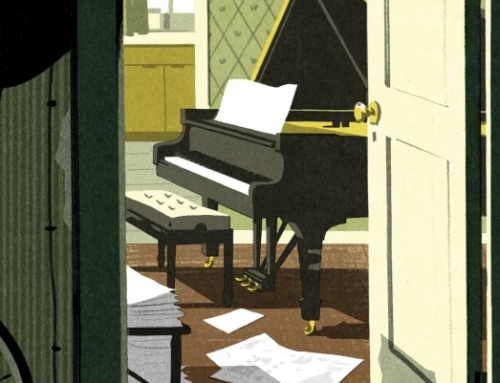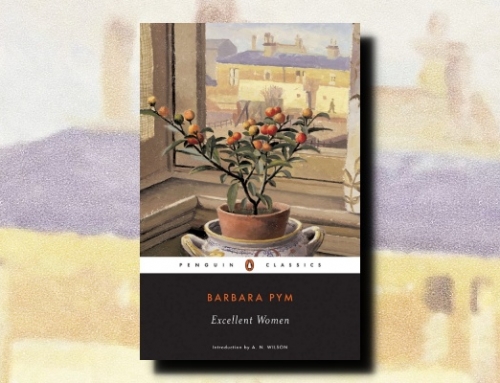
Nutshell
by Ian McEwan (2016)
Anchor (2017)
224 pp
 For over a decade I’ve considered myself officially “off” Ian McEwan. I like what I’ve read of his earlier work, I like — but don’t love — Atonement, I like On Chesil Beach, but then I started to feel there wasn’t much there. Oh, the man can flourish-up a sentence, a scene, an entire novel, but when I felt it was meant to serve the “important novel” I fell away. I’m not entirely back, but I got a kick out of his short story “My Purple Scented Novel” when The New Yorker published it (see post here). It was fun. The flourishes, which were many, were in the service of a character who should be pitied for his talents, not admired, and I loved it. When I read the premise of his 2017 novel Nutshell I wondered if it would be in a similar vein. After all, how can an author write an “important” Hamlet adaptation when the poetic, philosophizing, vacillating protagonist is an unborn child?
For over a decade I’ve considered myself officially “off” Ian McEwan. I like what I’ve read of his earlier work, I like — but don’t love — Atonement, I like On Chesil Beach, but then I started to feel there wasn’t much there. Oh, the man can flourish-up a sentence, a scene, an entire novel, but when I felt it was meant to serve the “important novel” I fell away. I’m not entirely back, but I got a kick out of his short story “My Purple Scented Novel” when The New Yorker published it (see post here). It was fun. The flourishes, which were many, were in the service of a character who should be pitied for his talents, not admired, and I loved it. When I read the premise of his 2017 novel Nutshell I wondered if it would be in a similar vein. After all, how can an author write an “important” Hamlet adaptation when the poetic, philosophizing, vacillating protagonist is an unborn child?
Yes, it’s a gimmick, but one particularly suited to McEwan’s predilections. The epigram he chooses is this:
Oh God, I could be bounded in a nutshell and count myself a king of infinite space — were it not that I have bad dreams.
Our unnamed male fetus begins his tale by reflecting on better days, before his living space became so cramped and, importantly, before he head whisperings of “deadly intent”:
That was in my careless youth. Now, fully inverted, not an inch of space to myself, knees crammed against belly, my thoughts as well as my head are fully engaged. I’ve no choice, my ear is pressed all day and night against the bloody walls. I listen, make mental notes, and I’m troubled. I’m hearing pillow talk of deadly intent and I’m terrified by what awaits me, by what might draw me in.
At this point, the narrator suspects that his mom, Trudy, and her lover, Claude, are plotting the murder of his father John. He despises Claude and so is willing to put it all on him at this point. But it doesn’t take long before he realizes that he is deluding himself. His beloved mother seems — no — is in on the plot as well. Here is the passage that evokes several passages from Hamlet to show us how the narrator solidifies his understanding:
Seems, Mother? No, it is. You are. You are involved. I’ve known from the beginning. Let me summon it, that moment of creation that arrived with my first concept. Long ago, many weeks ago, my neural groove closed upon itself to become my spine and my many million young neurons, busy as silkworms, spun and wove from their trailing axons the gorgeous golden fabric of my first idea, a notion so simple it partly eludes me now. Was it me? Too self-loving. Was it now? Overly dramatic. Then something antecedent to both, containing both, a single word mediated by a mental sigh or swoon of acceptance, of pure being, something like — this? Too precious. So, getting closer, my idea was To be. Or if not that, its grammatical variant, is. This was my aboriginal notion and here’s the crux — is. Just that. In the spirit of Es muss sein. The beginning of conscious life was the end of illusion, the illusion of non-being, and the eruption of the real. The triumph of realism over magic, of is over seems. My mother is involved in a plot, and therefore I am too, even if my role might be to foil it. Or if I, reluctant fool, come to term too late, then to avenge it.
That may be a lot to take. McEwan can be precious. But I find him delightful when he is being precious for a reason. He’s having fun with his ingenious narrator, and I feel I’m in on it. I love, for example, how he presents Claude to us:
For Claude is a man who prefers to repeat himself. A man of riffs. On shaking hands with a stranger — I’ve heard this twice — he’ll say, “Claude, as in Debussy.” How wrong he is. This is Claude as in property developer who composes nothing, invents nothing. He enjoys a thought, speaks it aloud, then later has it again, and — why not? — says it again.
If we know our Hamlet then we know that soon the narrator will realize that Claude is not merely Trudy’s lover, he is more closely related to John and, therefore, to the child in the womb. The fetus’s shame is both funny and genuinely sad. On that line McEwan manages to make this fun story more interesting and profound than it has any right to be — here is a narrator who, before birth, can genuinely reflect on his identity and whether to be or not to be.
Also, if we know our Hamlet, we start to wonder what role our narrator might play in all of this. As a silent, though omnipresent, observer, it seems his role must remain entirely passive, as Hamlet himself may have wanted it. But Hamlet didn’t remain passive. How will our narrator become part of the action?
So, all in all, Nutshell is a good time and then some. It, along with “My Purple Scented Novel,” have helped me get back into McEwan. I’ve already started reading his forthcoming Machines Like Me, so I’ll hopefully have some thoughts on that one soon as well.








Leave a Reply